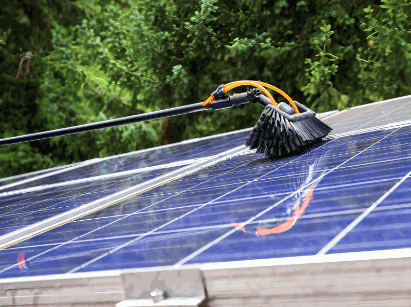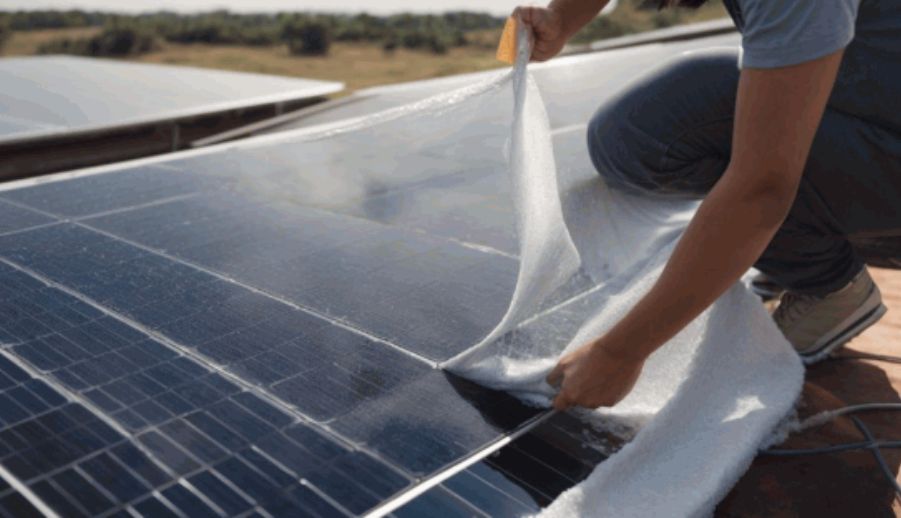Solar panels are a valuable investment for renewable energy production, but to ensure optimal performance, regular cleaning is essential.
Factors like dust, bird droppings, and pollen can affect the efficiency of solar panels. We will explore why it is important to clean solar panels, how often they should be cleaned, the best time to do so, different cleaning methods, dos and don’ts of cleaning, common mistakes to avoid, and how regular cleaning helps maintain efficiency.
Learn more about how to keep your solar panels in top shape!
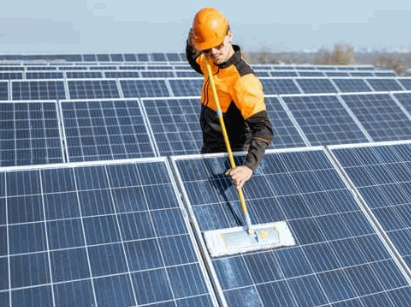
Why Is It Important To Clean Solar Panels?
Regular cleaning of solar panels is crucial to ensure optimal performance and efficiency of the system.
Dirt, dust, and debris accumulation on solar panels can significantly reduce their ability to absorb sunlight and convert it into electricity. This build-up creates a barrier between the sunlight and the solar cells, diminishing the system’s energy output.
By maintaining clean panels through regular cleaning, you can maximize the amount of sunlight they capture, leading to higher energy production and increased efficiency. Clean solar panels not only function better but also last longer, providing you with more reliable and sustainable energy for years to come.
Explore further: Is Solar Panel Green Energy
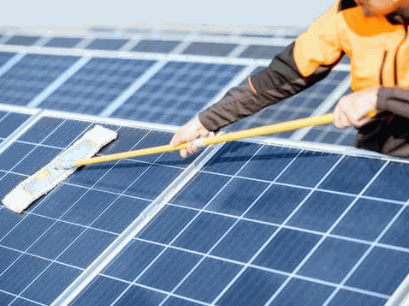
What Are The Factors That Affect Solar Panel Performance?
Several factors can influence the performance of solar panels, with cleanliness playing a pivotal role in their effectiveness.
- Dirt, dust, and debris accumulating on the surface of solar panels can create barriers that hinder the absorption of sunlight, thereby reducing the energy output.
- Regular maintenance routines, such as occasional cleaning with mild soap and water, can help prevent this buildup and ensure that the panels operate at maximum efficiency.
Clean solar panels not only generate more electricity but also have a longer lifespan, providing a cost-effective and sustainable energy solution for residential and commercial properties alike.
Dust And Dirt Accumulation
Accumulation of dust and dirt on solar panels can significantly reduce their efficiency and performance over time.
- This buildup of debris creates a barrier between the sunlight and the solar cells, decreasing the panels’ ability to convert sunlight into electricity efficiently.
- When the surface of solar panels is covered with dust, they are unable to capture as much sunlight, leading to a decline in energy production.
Periodic cleaning is essential to maintain optimal performance levels and ensure that the panels are operating at their maximum potential. By keeping the panels clean, you enhance their ability to generate more electricity, contributing to a higher energy yield for your solar system.
Bird Droppings And Debris
Bird droppings and debris pose a risk to solar panel efficiency and necessitate regular cleaning to prevent damage and ensure optimal performance.
This buildup can block sunlight from reaching the solar panels, reducing their energy output and consequently impacting their overall efficiency. The accumulation of bird droppings may also contain acidic substances that can corrode the panel surface over time.
To mitigate these risks, it is crucial to establish a routine maintenance plan that includes inspecting and cleaning the panels periodically. By promptly removing any debris or droppings, solar panel owners can prevent potential damage, prolong the lifespan of the panels, and maintain their energy production levels efficiently.
Pollen And Tree Sap
Pollen and tree sap can adhere to solar panels, affecting their performance and necessitating the use of eco-friendly cleaning solutions for effective removal.
These natural residues pose significant challenges as they can create a barrier that obstructs sunlight, reducing the panels’ energy generation capabilities over time. When left unaddressed, pollen and tree sap can lead to discoloration and degradation of the panel surface, further impacting efficiency.
To combat these issues, it is essential to incorporate gentle cleaning practices and routine maintenance schedules to keep solar panels functioning optimally. By employing eco-friendly solutions, not only can the panels be cleaned effectively, but it also helps in minimizing the negative environmental footprint associated with conventional cleaning methods.
By adopting sustainable practices, solar panel owners can ensure longevity and efficiency while contributing positively towards environmental conservation efforts.
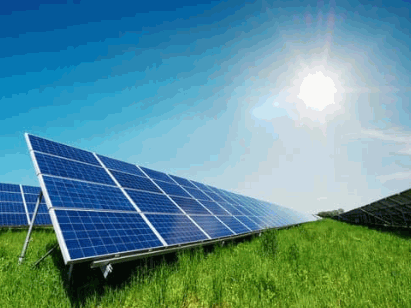
How Often Should Solar Panels Be Cleaned?
The frequency of cleaning solar panels depends on various factors, but a general guideline is to perform routine cleaning at least twice a year.
Factors such as local weather conditions, the amount of dust and debris accumulation, and the angle of panel exposure play a crucial role in determining the cleaning frequency. In regions with high levels of pollution or frequent dust storms, more frequent cleaning may be necessary to maintain optimal efficiency.
It is important to establish a maintenance schedule that takes into account these environmental influences to ensure that the panels are operating at their peak performance levels. Regular cleaning not only removes dust and dirt that can obstruct sunlight absorption but also helps to prevent long-term damage and build-up that may reduce the lifespan of the panels.
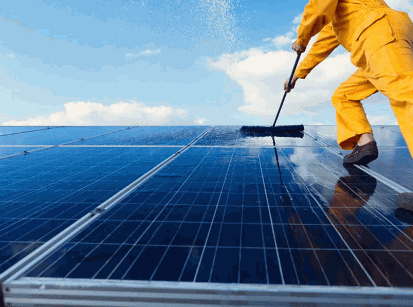
What Is The Best Time To Clean Solar Panels?
Choosing the right time to clean solar panels can enhance the effectiveness of the cleaning process and improve overall performance.
By considering seasonal variations and weather conditions, one can strategically plan the cleaning schedule for maximum efficiency. For instance, during the summer months when sunlight is abundant and dust accumulates quickly, more frequent cleanings may be necessary to maintain optimal production levels. Conversely, in regions prone to heavy rainfall, cleaning after a storm can help wash away dirt and debris effectively.
Monitoring panel conditions regularly is essential to identify any build-up or damage that may hinder performance. Climate effects such as snowfall or extreme heat can impact cleaning efficiency, making it crucial to adapt cleaning practices accordingly.
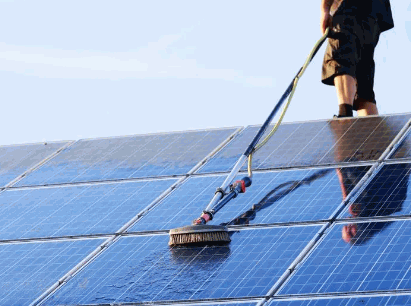
What Are The Different Methods For Cleaning Solar Panels?
Various methods can be used to clean solar panels, ranging from manual cleaning with basic tools to advanced automated systems and water-fed pole technology.
Manual cleaning techniques involve using soft brushes, lint-free cloths, and gentle scrubbing motions to remove dust, dirt, and grime without damaging the delicate panel surfaces. These methods are effective for regular maintenance tasks, ensuring optimal energy efficiency of the solar panels.
On the other hand, automated cleaning systems offer a more hands-off approach, utilizing robotics or mechanical arms to clean large arrays quickly and efficiently. Water-fed pole technology is particularly useful for hard-to-reach panels, providing a safe and effective way to clean without the need for ladders or scaffolding.
Applying protective coatings to the panels can help preserve their surfaces and prevent scratches or damage during the cleaning process, ultimately extending the lifespan of the solar panels.
Manual Cleaning
Manual cleaning involves using basic tools such as soft brushes, squeegees, and ladders to remove dirt and debris from solar panels effectively.
- Soft brushes are essential for gently scrubbing the surface of the panels to dislodge any grime or residue that may have accumulated.
- Squeegees come in handy for wiping away excess water and achieving streak-free results.
When using ladders to access higher panels, always ensure they are securely placed on flat ground and use appropriate safety gear like gloves and eye protection. Begin by rinsing the panels with water to loosen dirt, then proceed to gently brush them with a soapy solution before rinsing thoroughly with clean water for optimal cleanliness.
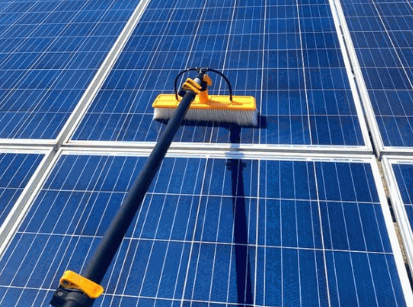
Automated Cleaning
Automated cleaning systems offer a hands-free approach to maintaining solar panels, enhancing efficiency and productivity in the cleaning process.
These innovative solutions utilize advanced technology to autonomously clean panels, ensuring thorough removal of dirt, dust, and debris. By eliminating the need for manual labor, automated systems not only save time but also reduce the risk of damage to delicate solar panels. The equipment used in automated cleaning processes is designed to optimize water usage, further enhancing environmental sustainability. Regular cleaning with automated systems helps to maximize energy production by ensuring panels operate at peak efficiency, making them a valuable investment for solar panel owners.
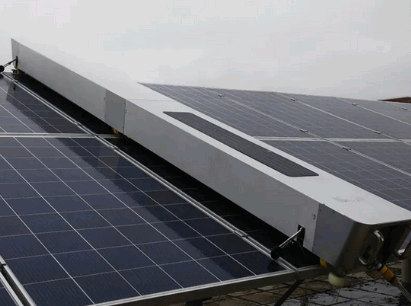
Water-Fed Pole System
The water-fed pole system utilizes purified water and gentle scrubbing action to clean solar panels effectively while minimizing the need for manual intervention.
This innovative cleaning method ensures that the panels are thoroughly rid of dirt, dust, and grime without the risk of damage from harsh chemicals or abrasive materials. Using distilled water in the cleaning process, eliminates the possibility of mineral deposits or streaks on the surface, leaving behind a streak-free and pristine finish. The gentle scrubbing action of the water-fed pole allows for the removal of stubborn particles without causing scratches or marks on the delicate surface of the solar panels. This technique not only enhances the efficiency of the panels by ensuring maximum sunlight absorption but also maintains their aesthetic appeal with a shiny and spotless appearance.
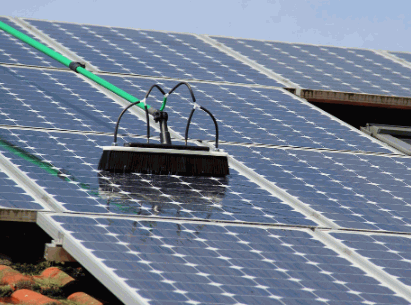
What Are The Dos And Don’ts Of Cleaning Solar Panels?
Following the dos and don’ts of solar panel cleaning is crucial to ensure effective maintenance without causing damage to the panels.
- When cleaning your solar panels, it is essential to use appropriate cleaning solutions that are specifically designed for this purpose. Harsh chemicals should be avoided as they can leave residues that hinder performance.
- Opt for a gentle soap solution or a mixture of water and vinegar. Always use soft, non-abrasive cloths or sponges to prevent scratching the panels.
- Thoroughly rinse the panels with clean water to remove any cleaning residue that may affect sunlight absorption.
Ensuring that you follow these guidelines will help maintain the efficiency and longevity of your solar panels.
Do: Use Soft Brushes Or Sponges
Using soft brushes or sponges with a mild cleaning solution can effectively remove dirt and grime from solar panels without causing scratches or damage.
To clean your solar panels, mix a mild soap solution with water in a bucket. Dip a soft brush or sponge into the solution and gently scrub the surface of the panels in a circular motion. Be sure not to apply excessive pressure to avoid any potential damage. Rinse the panels thoroughly with clean water to remove any soap residue. Regular cleaning using these gentle techniques will help maintain the efficiency of your solar panels and ensure that they continue to generate optimal power output.
Don’t: Use Abrasive Or Harsh Cleaning Solutions
Avoid using abrasive or harsh cleaning solutions that can damage solar panels and leave residues that impact their performance.
These aggressive chemicals not only strip away the protective coating on the panels but can also cause micro-cracks in the delicate surface, leading to reduced energy production.
The residue left behind by these solutions can create a barrier that blocks sunlight from reaching the photovoltaic cells, further diminishing the panel’s efficiency.
Experts recommend opting for gentle cleaning agents specifically formulated for solar panels to ensure effective cleaning without risking any harm to the panels or compromising their longevity.
Do: Rinse Thoroughly With Water
Thoroughly rinsing solar panels with water after cleaning helps remove dirt buildup and residues, ensuring a clean and clear surface for optimal performance.
Effectively rinsing with water post-cleaning is crucial as it not only removes any remaining dust or grime that may hinder the panel’s efficiency but also helps ensure that no residues of cleaning solutions are left behind. By thoroughly rinsing, you allow the panels to function at their best by maximizing sunlight absorption without any obstruction. Water, in this context, serves as a natural and effective cleaning agent that promotes the longevity and effectiveness of solar panels.
Don’t: Use High-Pressure Water Or Power Washers
Avoid using high-pressure water or power washers for cleaning solar panels as they can cause surface damage and compromise the protective coatings.
Instead, opt for gentle cleaning methods such as a soft brush or cloth with mild soap and water to maintain the integrity of the panels. Excessive pressure from power washers can lead to cracks or scratches on the surface, potentially reducing the efficiency of the panels over time.
It’s crucial to regularly inspect the panels for any signs of dirt or debris accumulation and promptly clean them using non-abrasive tools to ensure optimal performance.
By practicing gentle cleaning techniques, you can prolong the lifespan of your solar panels and maximize their energy production.
What Are Some Common Mistakes To Avoid When Cleaning Solar Panels?
Several common mistakes can occur when cleaning solar panels, including improper cleaning frequencies, residue buildup, and potential damage from harsh methods.
It is crucial for solar panel owners to adhere to recommended cleaning schedules to ensure optimal performance. Neglecting regular cleanings can lead to a decrease in energy production efficiency over time. Overlooking residue removal can obstruct sunlight absorption, impacting the panels’ overall productivity.
Harsh cleaning practices, such as using abrasive tools or harsh chemicals, pose a significant risk of scratching or damaging the panels’ surface, ultimately reducing their lifespan. By implementing gentle cleaning techniques and establishing a consistent maintenance routine, one can extend the longevity and effectiveness of their solar panels.
How Can Regular Cleaning Help Maintain Solar Panel Efficiency?
Regular cleaning plays a vital role in preserving solar panel efficiency by preventing damage, increasing lifespan, and ensuring consistent performance.
By regularly cleaning the solar panels, one can effectively remove dust, dirt, bird droppings, and other debris that accumulate over time. These elements can obstruct sunlight absorption, reducing the panel’s energy production capacity. Maintaining a clean surface helps in preventing corrosion and potential hot spots that could lead to malfunctions. The long-term benefits of such routine care practices are manifold, not only in terms of enhancing efficiency but also in safeguarding the overall quality and performance of the panels.
